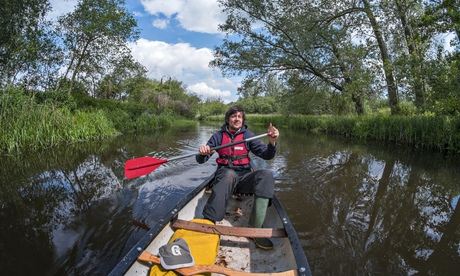
Bondage is so last year. Publishers who spent much of the past year in search of the next Fifty Shades of Grey are now seeking to exploit another literary phenomenon: the British public’s seemingly unfettered desire for nature writing.
In the past couple of years the genre has moved towards the publishing world’s centre ground thanks to several blockbuster books that have enjoyed critical and commercial success. Now it seems not a week goes by without another major new title hitting the shelves, backed by a major marketing campaign.
This month sees the publication of Rob Cowen’s Common Ground, described as a “portrait of a piece of pylon-strung edge-land, an unclaimed tangle of meadow, wood and river”. Then comes Patrick Barkham’s Coastlines, the third offering from the Guardian journalist seen as one of the genre’s emerging young stars. Also out now is Simon Armitage’s Walking Way, in which the poet explores the coastal fringes of south-west England.
Their publishers must be hoping that such titles will appeal to readers who lapped up Helen Macdonald’s H is for Hawk, which has sold more than 135,000 copies in the UK alone, won the Costa Book of the Year and the Samuel Johnson prize and has turned the Cambridge academic into a literary sensation.
“It’s astonishing, the impact of Helen Macdonald’s book,” Barkham acknowledged. “I know of nature books that are being released this year on the last Thursday in July, when Helen’s book was released. It’s now seen as the new magical date in publishing.”
Part memoir, part meditation on the relationship between the human and natural worlds, Macdonald’s book chronicles her attempts to win the trust of a goshawk as she struggled to come to terms with the death of her father.
Her book is often mentioned in the same breath as that of another Cambridge academic, the poster boy for the new nature writing movement, Robert Macfarlane, whose works – including The Wild Places and The Old Ways – have sold more than 300,000 copies in the UK, according to data supplied by Nielsen, a global firm that monitors what people read and buy.
Other writers who find themselves cited as exponents of the new genre include the Norfolk-based nature writer Mark Cocker, Scottish poet Kathleen Jamie and novelist Melissa Harrison.
Many tagged with the new nature writing label acknowledge their debts to those before them, suggesting they are simply reviving a tradition rather than forging a new path. In The Old Ways, universally praised as a masterpiece, Macfarlane acknowledges his debt to Edward Thomas, whose 1913 book, The Icknield Way, explored the poet’s journey between Suffolk and Wiltshire along one of Britain’s oldest thoroughfares. Macfarlane has been credited with rehabilitating forgotten writers such as Scottish poet Nan Shepherd, in the same way that Richard Mabey, perhaps Britain’s foremost nature writer, helped to resurrect the reputation of the “poet of the fields”, John Clare.
The genre’s proponents argue that it would be wrong to see the new nature writing as simply an exaltation of nature. “A lot of this writing is about questioning the values of our current society, and particularly questioning economic growth,” Barkham said. “We have to look at more meaningful ways of living. It’s not just about consumption and adding to our material wealth.”
Inevitably, the genre’s increasing popularity has meant that any successful book spawns a host of iterations. Three major new works about butterflies have emerged following the success of Barkham’s first book, The Butterfly Isles. Macfarlane’s success has led to a glut of well-received books in which an author sets out on a journey across Britain that becomes one of self-discovery.
It all makes for a crowded field, and one that Barkham acknowledges can be easy to categorise as “escapist whimsy”. Significantly, several of those cited as examples of the new breed of nature writer are uncomfortable with the term. Macfarlane prefers travel writer. “I have very mixed feelings about what is happening,” Mabey said. “I’m delighted that there is more writing about nature going on, but I’m increasingly confused by what this genre tag actually means. Nature writing ought to be writing about nature. I’m not sure books about pets ought to qualify, nor do I think books that are principally about the nature of the self ought to qualify.”
Mabey acknowledges that he is partly responsible for the current vogue of writing about nature to examine the self, of which H is For Hawk is the most prominent example. His acclaimed book Nature Cure examines how he came to understand the position of the individual in nature, an appreciation that helped to lift him out of a serious depression.
But now, in a sign of how much the genre has been transformed, Mabey is urging restraint. Nature writers, he argues, should concentrate on being the “translators of the language of the natural world … The highest objective is to let what is out there speak to us clearly in its own terms.”

